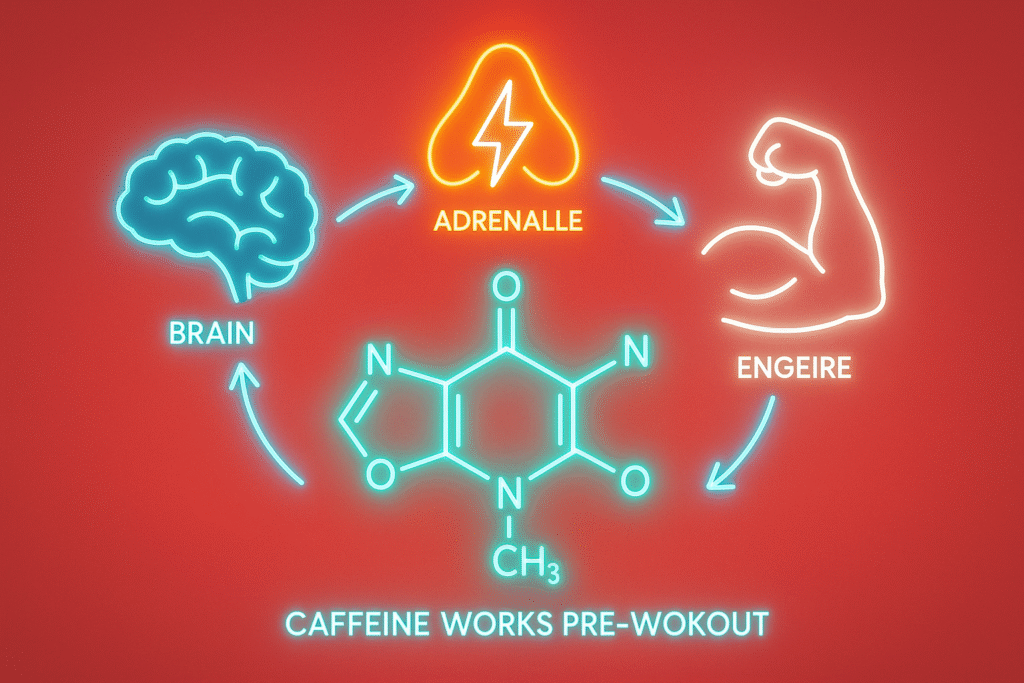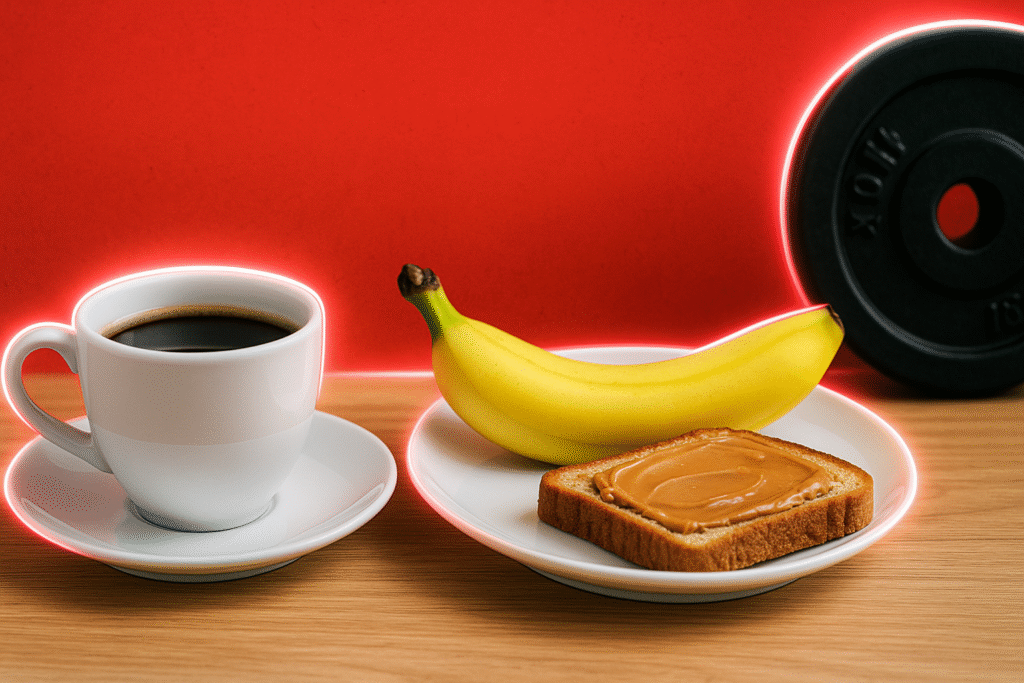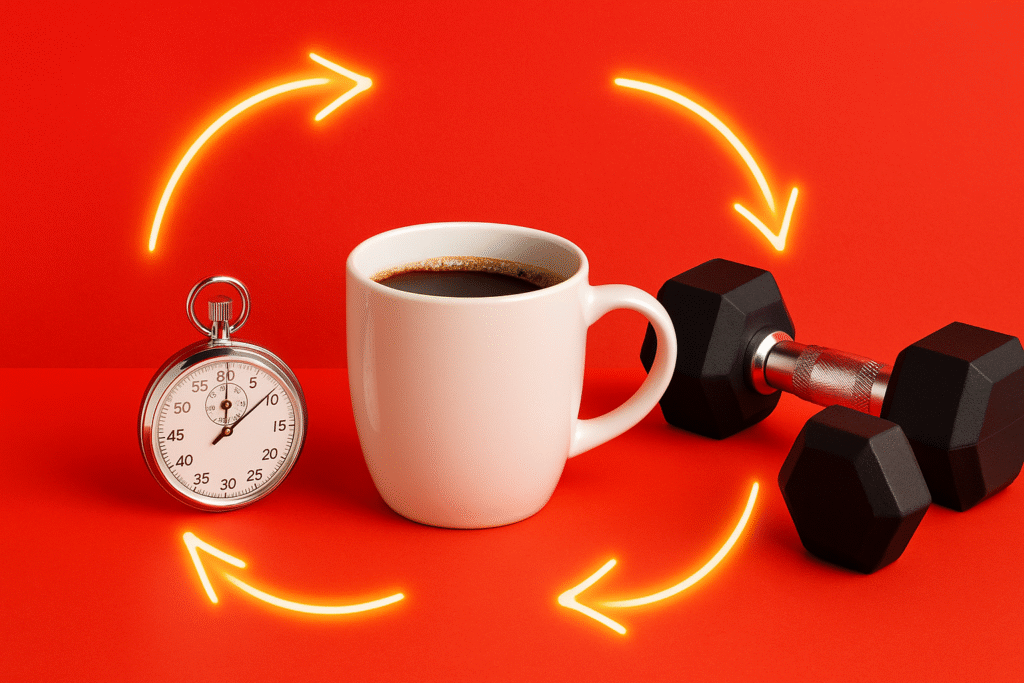Wondering if you should take caffeine with or without food before hitting the gym?
This choice can make or break your workout energy, focus, and fat-burning potential.
As a fitness trainer who has tested both approaches with myself and clients, I’ll share the real pros and cons—and help you decide what’s best for your body and performance.
Table of contents
Quick Answer – With or Without Food?
Many lifters wonder: Should you take caffeine on an empty stomach or with food before hitting the gym?
Here’s the short answer:
- Empty Stomach: Faster energy spike and stronger focus, but may cause jitters or stomach discomfort.
- With Food: Gentler on the stomach, smoother energy, and safer for beginners.
From my own coaching experience and years of bodybuilding, most people perform best with a light snack before caffeine—especially if they’re new to pre-workout stimulants.
How Caffeine Works Pre-Workout

Caffeine blocks adenosine, a neurotransmitter that makes you feel tired.
This allows your body to release adrenaline, which boosts alertness, muscle activation, and endurance.
Studies show caffeine can improve performance by 10–12%, making it one of the most trusted pre-workout aids for strength and fat loss training.
You can also explore how caffeine affects sleep and evening workouts if you train late in the day.
Benefits of Taking Caffeine on an Empty Stomach
- Faster Absorption: With no food, caffeine enters your bloodstream quicker, giving a strong kick before your warm-up ends.
- Sharper Focus: Many athletes report enhanced mental alertness during fasted morning training.
- Fat Oxidation: Some research suggests fasted caffeine may promote higher fat utilization during cardio.
Personally, I’ve felt a noticeable surge in motivation and explosive strength when drinking black coffee before a fasted morning lift.
However, this quick boost can also bring side effects if you’re sensitive. You can learn more about caffeine’s role in endurance vs. strength training to see how it fits your goals.
Benefits of Taking Caffeine With Food

- Gentler on Stomach: A light meal reduces nausea or acid reflux, common with fasted caffeine.
- Steadier Energy: Eating first slows caffeine absorption slightly, preventing sudden crashes.
- Reduced Jitters: Beginners and caffeine-sensitive people tolerate it better with carbs or protein.
I often grab a banana or a slice of whole-grain toast with peanut butter before drinking pre-workout coffee.
This keeps me focused and fueled for the entire session without discomfort. For fat loss phases, see how caffeine impacts appetite during cutting.
Factors That Influence the Best Choice
- Caffeine Sensitivity: If you’re highly sensitive, always eat something first.
- Meal Timing: If you had a balanced meal 1–2 hours ago, you can safely take caffeine without another snack.
- Workout Intensity: For long, grueling sessions, caffeine with food provides sustained energy. For short, explosive workouts, fasted caffeine may feel more powerful.
Some athletes also stack caffeine with other performance enhancers. If you’re considering combining it, check out our guide on beta-alanine, creatine, and caffeine stacks for safe strategies.
Best Practices for Pre-Workout Caffeine Timing

- Dosage: Stick to 150–250 mg for most people (about 1–2 cups of coffee).
- Timing: Take caffeine 30–40 minutes before training for peak effect.
- Snacks: If you’re prone to stomach upset, pair caffeine with light, easy-to-digest carbs or protein.
Advanced athletes sometimes combine caffeine with beta-alanine for an extra boost. Here’s how to do it safely: Caffeine + Beta-Alanine Stack.
Bottom Line
Caffeine is one of the most effective and affordable pre-workout boosters you can use.
The best approach? Start with caffeine and a light snack, then experiment with fasted intake once you know your tolerance.
I’ve seen real results with clients following this strategy. For example, Lucas from Germany used to get jittery from fasted caffeine before morning cardio.
Once he added a small slice of toast with coffee, his endurance skyrocketed, and his fat loss accelerated.
Similarly, Maria from Spain found her strength sessions more consistent after pairing her pre-workout coffee with a protein snack.
If you’re curious about alternatives to caffeine or how it compares to other stimulants, read our detailed Caffeine vs. Theacrine Comparison.
As a coach, my advice is simple: listen to your body, start safe, and find what gives you the best energy without the side effects.



Leave a Reply